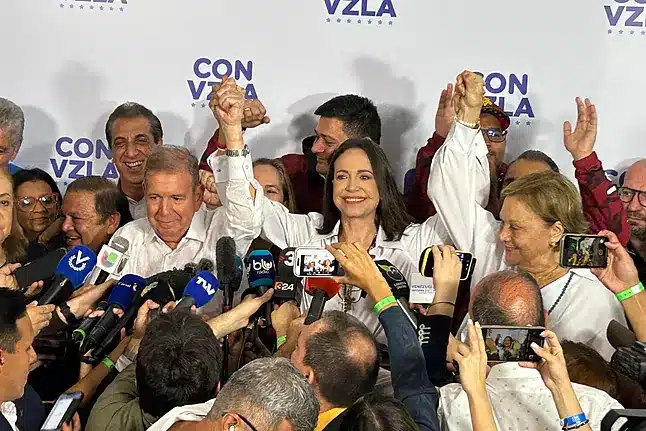Venezuela entered unknown territory on Sunday, full of uncertainties, after a day that has already gone down in the history of the struggle for democracy. The democratic country began to queue, knowing that 28-J was not a party, but an exercise in resistance against power. Long lines of citizens willing to stand for hours until they exercise their right, despite the countless traps of all kinds that the Bolivarian revolution set in their way.
For deep Venezuela, the states (regions) that pushed the caravan of freedom led by María Corina Machado, to the most popular neighborhoods of Caracas, it was now or never and they made it known. “My neighborhood has changed,” Kelly H., 21, told EL MUNDO at the main polling station in El Valle, the neighborhood that welcomed Nicolás Maduro in his childhood, where people almost always voted for the revolution. Until Sunday.
So much euphoria was translated into the exit polls, which gave the opposition candidate Edmundo González Urrutia as the winner by between 20 and 35 points, very similar to the one already granted throughout the campaign by independent pollsters to the former ambassador to Argentina and Algeria, a man so calm that he does not even look Caribbean. Edison Research, for The Wall Street Journal, predicted a triumph for the diplomat: 64% in his favor against Maduro’s 31%.
None of these polls were made public in Venezuela, but not the Hinterlaces poll despite being prohibited by law. This company, owned by an advisor to Maduro, declared its boss the winner without any credibility, but stirred up the hornet’s nest before its time. The opposition already knew that the plan of the revolution is to declare victory, barring a major surprise, and this false poll, like all those published during the campaign, confirmed it.
To do this, they prepared the final tactic of their plan A, with which they programmed this kind of fraud by chapters. The order was to make it as difficult as possible to deliver the voting records to the witnesses present at the count, as established by law.
It was the icing on the cake after a day of manual for the fraudulent electoral engineering that Chavismo has perfected for 25 years, from the delays in opposition areas to the premeditated closures, through the abuses of the military of the Republic Plan to the famous Operation Auction of all elections.
And not forgetting the repression: throughout the day there were at least 35 arbitrary arrests, which joined the more than 80 of the electoral campaign. There were also 28 cases of intimidation and harassment, mostly against opposition leaders and trade unionists.
“What we are seeing is the most important civic act in our history. More than nine million people have already voted [with five hours to go before the polls close], which represents a turnout figure of 41%. This is huge,” said María Corina Machado after exercising her right to vote in the Venezuelan capital. He did so without journalists, who were denied access to the polling station by the military.
“Today the desire to be free is a certainty: we are going to be free. The way things are going, I think we are going to have results, as they say, irreversible,” added the opposition leader. “I am proud that we are conquering a struggle for redemption,” certified the leader of Vente Venezuela, who explained that, thanks to the struggle of the opposition witnesses, it was possible to have representation in all the centers, despite the problems that arose in 1,300 tables.
On her tour of Caracas, from center to center, Machado was applauded in middle-class neighborhoods and popular neighborhoods. On the other hand, Nicolás Maduro voted early in the morning, for the first time in the presidential elections, to avoid boos.
In Petare, one of the largest favelas in Latin America, the queues of voters were veritable human rivers. Despite the hours of waiting because of Operation Morrocoy (Venezuelan tortoise), citizens were determined to exercise their right. Encouraged by the evidence, they began to sing: “And it is going to fall, and it is going to fall, this government is going to fall!” Héctor Rodríguez, Chavista governor of Miranda and very close to Maduro, was booed as he left the voting center in the Barrio Unión sector of Petare. According to the Center for Popular Research, the desire for change among the Venezuelan popular classes rises above 80%.
The bases of Chavismo looked more demobilized than ever on this election day, even the famous red dot (an awning installed near the electoral center where social control over people with ties to the State was extreme) was ramshackle. “Today the Chavistas are isolated,” Leanyer Rojas, 24, described to EL MUNDO.






